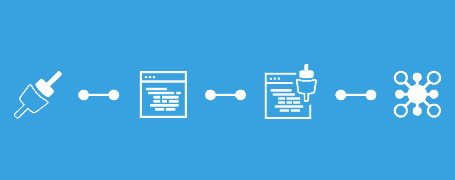EDI is an industry standard messaging protocol in the transportation logistics industry. It is also notoriously difficult to work with, as it is an aging technology, and is often not immediately compatible with newer types of systems like SaaS and mobile applications.
Yet companies in the transportation industry need modern B2B collaboration and integration with new systems as companies are now competing on supply chain efficiency. They have to reduce their non-production costs and streamline how they deliver their goods to market. Controlling supply chain costs is critical to business success today.
The necessity of efficient B2B collaboration
Redwood Logistics is a strategically integrated logistics provider based in Chicago. They have created a platform, called tms.IO, powered by MuleSoft that enables B2B collaboration among their customers, multiple systems and supply chain trading partners. They have taken advantage of and have worked to help businesses overcome the increasing pace of change in the supply chain and its supporting logistics networks.
“We really focus on enabling a wide range of customers to be successful,” says Rich Piontek, chief commercial officer of Redwood Logistics. “For example, mid-market companies need access to technology to be able to drive down their costs and automate processes. Redwood’s unique tms.IO platform is a direct response to and an enabler of our strategy to put powerful technology in the shipper’s hands, and be able to get that technology integrated faster, and at less cost, and with less customer IT resource burden, than ever before.”
Rich points out that dynamic supply chains are a business necessity with the disruptions taking place in the e-commerce, and, ultimately, transportation industries, necessitating efficient B2B collaboration. “E-commerce fundamentally changed distribution patterns in this country today. Speed, velocity, shorter transportation runs, more regional strategies…distribution networks are fundamentally changed from someone being able to be successful with five distribution centers around the country; now they have to have 15. Shipments are smaller, orders are more frequent, and these transportation runs are shorter – all of it based on the responsiveness required by the consumer. It’s changed the retail supply chain forever.”
The single biggest change, Rich says, is how quickly change now occurs in distribution networks. “Shippers must be willing to reconsider brick and mortar networks much more frequently,” he says. “In the past, a person could run their business off a fixed distribution network for many years in the same structure. Today, because of the speed of change that affects everybody’s business, regardless of what market sector you’re in, you have to be willing to change your distribution network structure very, very quickly.”
How a B2B integration strategy created a new business model
To make responding change easy for their target customers, Redwood built the tms.IO platform, powered by MuleSoft. “It really allows us to give these customers quick, easy, lower-cost access to great technology, allowing them to level the playing field in their own end markets,” Rich says. “We’re making a difference on mid-market shippers’ ability to be competitive in their own end markets with our tools and our knowledge…it allows us to give customers a world-class level of performance in their transportation and logistics management, and to do so at a time and cost that is not prohibitive given their size.”
What the tms.IO platform does is provide a technological solution to analyzing data for better business intelligence. “It enables our customers to make rapid business decisions regarding their freight and transportation spend,” says Eric Rempel, the CIO of Redwood Logistics. “These decisions range from real-time execution all the way to analyzing networks or perhaps even looking at various business opportunities that they might see out in their supply chain. It enables customers to send whatever data they have, and we take care of the rest. By intercepting that data through one end point, we can then perform intelligent routing decisions, or even analyze their data for them with tremendous ease. All the customer needs to do is connect to one end point.”

API-led connectivity, MuleSoft’s approach to integration, has been key in helping Redwood Logistics build the tms.IO platform. “The API-led approach has completely changed our perspective. By separating our systems, our process, and orchestration, as well as the top experience layer, has not only allowed us to have reusable components, and reusable features, but it’s also changed the perspective that our developers and line of business stakeholders have in terms of the art of the possible,” says Eric Rempel. “It starts with just having reliable connectivity from MuleSoft, and afterward we really focus on listening to customer needs. Then, our engagement managers and customer success managers can deploy their own solutions without the need for coding, so we can take customer ideas and execute them in a fraction of the time of what we did before.”
The results of this platform, built on a B2B integration strategy, have been dramatic, says Rich Piontek. “We have gone from being able to take a customer and onboard them from a six to nine-month time frame average, to today, the very same implementation can be duplicated in 60 days, and that includes all of the testings. We’ve made a fundamental, profound difference in our ability to implement customers quickly, and that lowers our costs, and that lowers the cost to the customer, which directly drives our value proposition of making mid-market customers more successful faster. Our implementation timeline is three times faster today than it was before we implemented the MuleSoft platform.”
Also, the reduction in costs enabled Redwood to use their B2B collaboration platform to help this underserved market of mid-size shipping companies, creating a new business model for them. “The mid-market has been under-served because larger providers in our business have a very difficult time scaling their costs down to the spend ranges, the transportation budgets that are what’s common in the mid-market,” Rich points out. “It’s very difficult for large logistics providers to scale their cost infrastructure down for technology integration the way we’ve been able to do with MuleSoft. MuleSoft’s Anypoint Platform has a profound difference in our ability to serve a marketplace that’s been challenged to get these technologies and these benefits from other providers.”
Take a look at more resources to learn how MuleSoft’s B2B solution could help your business.








